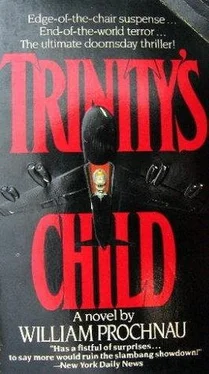“Thirty years of eternal vigilance.”
“Come again, commander?”
Kazakhs shook his head.
“You okay, commander?” Moreau asked.
“Ten degrees left,” he said sluggishly.
Moreau moved the bomber left again. Kazakhs watched an ice-white beacon edge toward the nose of the B-52. Then, suddenly, the beacon turned to a shimmering star, the redness washed away over the wings, and the sky opened again into a black and familiar panorama. Kazakhs slowly let the curtain slip back into place and sagged back into his seat.
“We’re out of it,” he said. He felt an arm on his shoulder and turned numbly around. Halupalai hovered over him with a confused look on his face. In the background Kazaklis could hear a new din and it took him a moment to realize it was the audio alert for an incoming message. Halupalai handed him a small piece of paper.
The pilot examined the code-garbled lettering, turned to look into Halupalai’s blank face, and then examined the encrypted message again. Behind his ear, the telegraph clattered. The message was so brief he did not need his code book to unravel it.
“Where’s the rest of it?” Kazaklis asked.
“That’s it, commander,” Halupalai answered. “The machine’s sending bomb codes now. To arm the weapons.”
Kazaklis stared unseeing into the flash curtains. His bedeviled brain felt like mush. Something was wrong. The world behind him was not functioning properly. He had the sinking feeling everything was out of control. The message made no sense. He reached for the code book to confirm what he already knew. Finished, he looked back at Halupalai.
“Did you decode it?”
“Regulations, sir. Three of us have to confirm it.”
“How do you read it?”
“Same as you, commander.”
“Dammit, Halupalai, tell me what you read.”
“Proceed. And you, sir?”
“Proceed.”
“Proceed?” Moreau interrupted. “Proceed where?”
They ignored her.
“Take it down to Tyler.”
“Tyler?”
“Tyler! The navigator has to confirm it.”
Halupalai disappeared into the back of the compartment. Kazaklis sat waiting.
“Proceed where?” Moreau asked again.
“Something’s screwed,” Kazaklis said.
“Commander!” Moreau asked more urgently.
“We got your message, copilot. No boy. No girl. It’s a person. Tyler? Do you read that?”
“Yes, sir.”
“Well?”
“It says proceed, sir.”
“Confirmed.”
“Sir?” Tyler asked strangely. “Proceed where?”
Kazakhs turned his head away from Moreau. His eyes lingered briefly on the red bomb lever and then focused on the pouch of navigation charts at his left. In those charts the route to their primary target—across Faddeevski Island and toward Tiksi, through the Verkhoyansk Mountains and along the Lena River, down the frozen shore of Baikal and back up the loop toward Irkutsk—was cross-hatched into one-kilometer squares. A generation of satellites and several generations of spies and tourists and Soviet dissidents had mapped every isolated grain elevator and tower, every mountaintop and missile battery a ground-hugging bomber might find troublesome, no bugsquishing wanted. Behind him, in the storage bays between the pilot and the gunner, similar charts were filed for every inch of the Soviet Union—and China. On the chance the Yellow Peril decided to become perilous again. He had charts of every railroad crossing and gravel road from Shanghai to Sevastopol.
“How the hell do I know?” Kazakhs roared. “Just proceed!” And the groaning bomber, nudged by Moreau, banked blindly north again.
In the Looking Glass, the colonel nudged the preoccupied general. “Opposition, sir.”
“Where?”
“Everywhere. Coming out of the Leningrad-Moscow corridor at the Buffs. Coming out of Siberia.” He paused. “Coming out of the Gulf.”
“The Gulf?” Alice swiveled an alarmed look at Sam.
“Submarine launches. From the Yucatan Channel near the Cuban coast.”
“Christ. What do the missile trajectories show?”
“Looks like they’ve targeted Baton Rouge.”
Alice slumped. “Condor?”
“Harpoon’s got some kind of trouble on the ground.”
Alice slowly turned back toward his map. He ran his eyes over the green dots. They clustered around Moscow and Leningrad, then became random and isolated as they spread across the expanse of Russia. Smaller clusters at Plesetsk and Tyuratam. Single dots here and there. Command posts. Leadership bunkers. Places where men plan wars. Turn them on. And off. The general allowed the air to whoosh out of him. Opposition. You aren’t making this any easier, comrades.
In the dark of the Maryland night, Sedgwick had a small fire going. But the cold still worked through to the marrow of his bones. The rear section of Nighthawk One lay nearby, where it had settled after ripping away from the rest of the chopper in the blast-wave crash and sliding down into this black gully. Far off, Sedgwick could hear strange sounds. But in four hours the sounds had not come closer. He had no idea where he was. He could see no lights. It was as if they had dropped off the edge of the world, and yet he knew he could be no more than a dozen miles from Washington.
On the other side of the fire the President lay quietly under several blankets which Sedgwick had spread over him after pulling the unconscious man from the wreckage. The President had been out since—only an occasional groan or a painful grunt letting the young naval officer know his Commander-in-Chief was still alive. Sedgwick stared at the bundled form. The President’s labored breathing caused the blankets to rise and fall ever so slightly. Sedgwick knew he had to get the man out of here soon or the blankets would stop heaving. But he didn’t know how.
Every civilization must go through this. Those that don’t make it destroy themselves. Those that do make it wind up cavorting all over the universe.
—Dr. Theodore B. Taylor, a theoretical physicist who abandoned bomb-making
• 1000 Zulu
Outside, incandescent flares floated slowly downward like wounded fireflies, spreading the harsh white light of phosphorous through layered levels of the southern night’s drizzle and smoke. No more than one hundred yards from the E-4’s wingtip, Harpoon could see the outlines of an overturned and smoldering half-track. The periphery line had been set there, with the shadowy outlines of men crouching behind it and other troops stretching into the darkness on both sides. Beyond, the airport terminal building was burning, orange flames licking into the void and casting different shadows on milling masses of pushing, shoving forms. A quiet, low moan rose and ebbed in the distance, undulating in a haunting sound that cut through the impatient whine of the giant aircraft’s engines. This was a safe area, more than 150 miles from the nearest nuclear detonation. The pop-pop-a-pop of automatic-rifle fire, then the quick clatter of a not-too-distant machinegun burst, snapped Harpoon back to the job at hand. Beneath him, slightly below the only open hatch of the rescue plane, men shouted at him. Harpoon leaned down toward a ramp that did not quite reach the high door of the plane. He grasped a hand mat slipped immediately out of his grip, forcing him to reach down a second time, clasp the wrist, and hoist the man the final few feet into the darkened doorway.
Harpoon probed through the gloom for a look at the man he had hauled aboard. “Mr. President?” he asked tentatively.
The man breathed in heavy wheezes. “Barely,” he replied with great effort. “Just barely.”
Читать дальше












